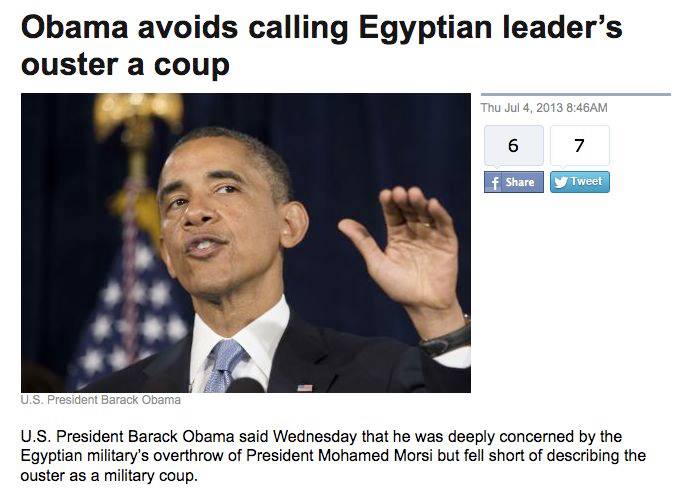 There’s been a fair bit of news stories not just about what went on in Egypt the other day but, more specifically, about the U.S. reaction to what went on in Egypt the other day. With around $1.5 billion in annual U.S. foreign aide on the line (second only to its aide to Israel), the reaction is curiously (or predictably? — now that’s a good question!) focused, at least for the time being, on what to classify — and thereby how to understand and react to — what just happened. Sure, an Egyptian general stepped in front of a camera, the duly elected (though now widely unpopular) President was deposed and detained, a number of his party’s senior leadership were also detained, the Constitution was suspended, and military officers swore in its own pick as interim President.
There’s been a fair bit of news stories not just about what went on in Egypt the other day but, more specifically, about the U.S. reaction to what went on in Egypt the other day. With around $1.5 billion in annual U.S. foreign aide on the line (second only to its aide to Israel), the reaction is curiously (or predictably? — now that’s a good question!) focused, at least for the time being, on what to classify — and thereby how to understand and react to — what just happened. Sure, an Egyptian general stepped in front of a camera, the duly elected (though now widely unpopular) President was deposed and detained, a number of his party’s senior leadership were also detained, the Constitution was suspended, and military officers swore in its own pick as interim President.
It looks an awful lot like a coup and it sure smells like a coup, yes — but is it a coup?
If you’ve not heard, the U.S.’s Foreign Assistance Act of 1961 (22 USC) — specifically, chapter 91, subchapter II, section 8422 (Authorization of Assistance) — reads:
 “Military intervention,” “national reconciliation,” or “popular uprising,” therefore sound like pretty good autocorrect options when the alternative is criminalizing what just went on with this very strategic ally in the Middle East.
“Military intervention,” “national reconciliation,” or “popular uprising,” therefore sound like pretty good autocorrect options when the alternative is criminalizing what just went on with this very strategic ally in the Middle East.
Though, to be honest, I’m not sure why reporters are so excited by all the rhetorical contortions among government spokespeople — or why all the contortions to begin with — since section 2753 (did they even read it?), noted above, states pretty clearly (among its four conditions for exemption):
 So all it takes is for the President to determine that it is in the U.S.’s interest to support the action and, voila, what seemed like a coup no longer smells the same as it once did.
So all it takes is for the President to determine that it is in the U.S.’s interest to support the action and, voila, what seemed like a coup no longer smells the same as it once did.
There’s so many wonderfully interesting things going on in this one very recent example, but for the time being just consider that we have here an instance of how the only rules that actually work — that continue to have relevance in ever changing circumstances — are those that have built within them a way to manage their own inevitable failure. For a list without “Miscellaneous” among its items will not work very well since the world invariably proves more complicated than the scenarios we cook up to manage it and thereby make sense of it (“Was the Dodo bird a bird?”). So too with rules and exemptions–after all, consistency is likely the last thing any of us actually want, at least when it comes to things like tax exemptions and how tall you have to be to ride the roller coaster.
So I guess the rule in this case is “i before e except after friends do the c-word.”
